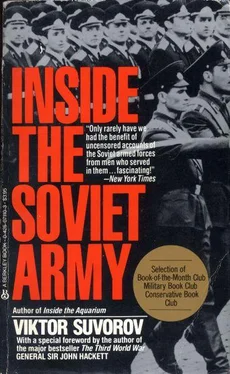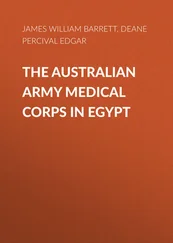Ninety-five per cent of all work, except for political training, is done out of doors, rather than in classrooms — in the open country on ranges, in tank training areas, in tank depots, etc. All periods, except for political training, involve physical work, which is often very strenuous.
For instance, tactical training may involve six hours digging trenches in blazing sun or in a hard frost, high-speed crossings of rivers, ravines, ditches and barricades, rapid erection of camouflage — and everything is done at the double. Instruction in tactics is always given without equipment. Thus, a tank crew is told to imagine that they are in a tank, attacking the enemy `on the edge of the wood over there'. Having run to the wood, the crew returns and the tank commander explains the mistakes they made — they should have attacked not on the crest of the hill but in the gully. Now, once again… Using this system of instruction, you can quickly teach a crew, who may be unable to understand complicated explanations, how an enemy should be attacked, and how to use every hollow in the ground to protect their own tank in battle. If they don't, well they just run off again, and again, and again for the whole six hours if necessary.
Weapon training involves study of weapons and of combat equipment. But you should not imagine that a platoon sits in a classroom, while the instructor describes the construction of tanks, guns and armoured personnel carriers.
The sergeant shows a young soldier an assault rifle. This is your personal weapon. You strip it like this. You are allowed 15 seconds to do this. I will show you and then we will practise it — do it again — and again — now do it with this blindfold. And again… This is our tank. It carries 40 shells, each of which weighs between 21 and 32 kilogrammes, according to type. All the shells are to be loaded from these containers through this hatch into the tank's ammunition store. You've got 23 minutes to do this. Go! Now do it again — and again — and again.
Any process, from changing a tank's tracks or its engine to running in rubber protective clothing during CW training, is always learned by practical experience and practised again and again until it becomes entirely automatic, every day, every night for two years. So many seconds are allowed for each part of the operation. Make sure you do it this time: if you don't you'll have to practise it again and again and again, at night, on Sundays, on Sunday nights.
Exceptional physical strain is put upon Soviet soldiers. During his first days in the army a young recruit loses weight, then, despite the revolting food, he begins to put it on, not as fat, but as muscle. He starts to walk differently, with his shoulders back, a mischievous twinkle appears in his eye and he begins to acquire self-confidence. After six months, he begins to develop considerable aggression, and to dominate the scum. In his battles with the latter, he wins not only because of tradition, or the support of his seniors, his NCOs and officers — he is also physically stronger than they are. He knows that recruits coming into the army are far weaker than he is — he has six months of service behind him. Within a year he has become a real fighting-man.
A Soviet soldier is forced to adapt to circumstances. His body needs rest and he will find a thousand ways to get it. He learns to sleep in any position and in the most unlikely places. Don't ever think of giving an audience of Soviet soldiers a lecture with any theory in it — they would fall asleep at your very first words.
At 1500 hours the platoon, exhausted and dripping with sweat, returns from training, and tidies itself up. Hastily, everyone cleans boots, washes, puts things right — at the double, all the time. Dinner parade — they march off, singing, to the dining hall and spend 30 minutes there over disgusting, thin soup, semi-rotten potatoes with over-salted fish and three slices of bread. Hurry, hurry. `Company, on your feet! Fall in! Dinner is over. They march off, singing, to the barrack-room. From 1600 to 1800 they clean weapons, service equipment, clean the barracks and tidy the surrounding area. From 1800 to 2000 `self-tuition'. This means training which is devised not by the divisional staff but by the sergeants. `50 press-ups. Now do it again… You didn't make much of a job of loading those shells. Try it again… Now once more… The time you took to run three kilometres in your respirator was poor. Go and do it again.
From 2000 to 2030 — supper. Kasha or potatoes, two slices of bread, tea, a lump of sugar. `Butter? — you had that this morning. After supper a soldier has 30 minutes of free time. Write a letter home, read a paper, sew up a senior soldier's collar-lining for tomorrow's inspection, clean his boots until they gleam, iron his trousers.
At 2100 hours there is a formal battalion, regimental or divisional parade. Evening roll-call, a run-through of the time-table for tomorrow and of the results of today's training, more sentences imposed by military tribunals and then an evening stroll. This takes the form of 30 minutes of drill, with time kept by drum-beat, and training songs, yelled out by several thousand voices. At 2145 the soldier reaches the barracks again, washes, cleans his teeth, polishes and cleans everything for next morning. At 2200-lights out. For those, that is, who are not on night exercises. The timetable makes provision for 9 hours of night training each week. No allowance is made for loss of sleep. These night exercises can, of course, go on for any length of time. And those who are not on night exercises may be got out of bed at any moment by a practice alert.
4
Saturday is a working-day in the Soviet Army. What makes it different from other days of the week is that the soldiers have a film-show in the evening. No — not about James Bond, but about Lenin or Brezhnev.
Sunday is a rest-day. So reveille is at 0700 hours, instead of 0600. Then, as always, morning toilet, PT, breakfast. And then free time. This is what the political officer has been waiting for. There is one of these `Zampolits', as they are called, in each company, battalion, regiment and so on. The Zampolit can only work with the soldiers on Sundays, so his whole energy is devoted to that day. He arranges tug-of-war competitions and football matches — more running! He also gives lectures about how bad things were before the Revolution, how good life is nowadays, how the peoples of the world groan under the yoke of capitalism and how important it is to work hard to free them. In some regiments the soldiers are allowed to sleep after dinner. And how they sleep — all of them! On a bright sunny Sunday, sometimes, a division looks like a land of the dead. Only very occasionally is a single figure — the duty officer — to be seen walking around. The silence is astonishing and unimaginable at any other time. Even the birds stop singing.
The soldiers sleep on. They are tired. But the Zampolits are not tired. They have been resting all week and now they are bustling about, wondering what to organise next for the soldiers. How about a cross-country run?
Sunday does not belong to the Soviet soldier, and so he reckons, reasonably enough, that this day, too, lasts 1,441 minutes instead of 1,440.
1
Practice makes perfect. This is a wise saying, which the Soviet Army accepts.
Accordingly, during his service every soldier goes through the same cycle of instruction four times.
Each of these lasts for five months, with one month as a break before the next one begins. During this interval, the soldiers who have completed their service are demobilized and the new intake arrives. In this month the recruits go through their Young Soldier's Course: the remainder overhaul and repair equipment and weapons, and do maintenance work at barracks, camps and firing-ranges. They are also used for various sorts of heavy work. This is not always for the Armed Forces; sometimes they become labourers on State projects. Then the five-month cycle of instruction begins. All the subjects in the training schedule are covered but during the first month the emphasis is on the individual training of each soldier. The youngest ones learn what they need to know and do, while the older ones repeat everything for the second, third or fourth time. As a soldier's service lengthens, the demands he must meet increase. A soldier who has only just joined may be required to do, for instance, 30 press-ups, one who has served for 6 months 40, after a year he will have to do 45 and after 18 months 50. The standards required increase similarly in every type of activity — shooting, running, driving military vehicles, resistance to CW materials, endurance without an air-supply in a tank under water, etc.
Читать дальше












